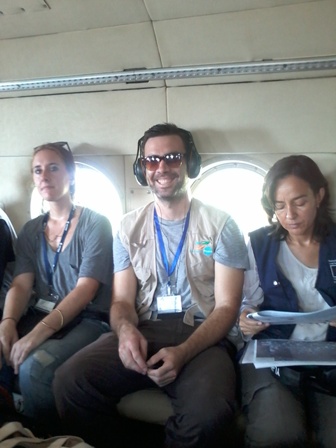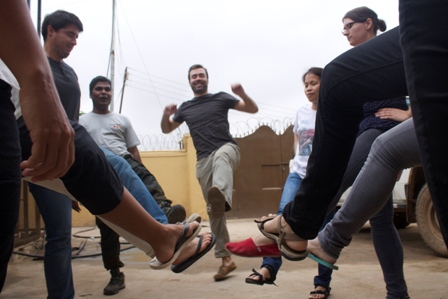David Browning
By David Browning, Nonviolent Peaceforce Team Leader – Minkaman in South Sudan
 Over the last couple of months I have been privileged to support the leadership of Awerial County. These leaders are desperately trying to contain a conflict between clans that has repeatedly threatened to spiral out of control. I have long been fascinated by the demands and responsibilities of leadership; what I have witnessed has imbued a belief in me that there is hope for this deeply troubled country.
Over the last couple of months I have been privileged to support the leadership of Awerial County. These leaders are desperately trying to contain a conflict between clans that has repeatedly threatened to spiral out of control. I have long been fascinated by the demands and responsibilities of leadership; what I have witnessed has imbued a belief in me that there is hope for this deeply troubled country.
The conflict began in late October when a cattle camp infected with the tick borne disease East Coast Fever moved from Minkaman, where the Nonviolent Peaceforce (NP) team is based, to Dor Payam, 30 km north. The cattle camp had been repeatedly asked by the local government to remain in Mingkaman so their cattle could receive treatment. However, not understanding how the disease is spread, they decided to leave their camp in an attempt to escape the disease.
We were rightly concerned that the arrival of infected cattle in Dor would cause conflict; as several other camps of cattle were there at the time. Our team was in Dor discussing the issue with the respective camps and the local government when the fighting started. We had received assurances from the infected camp that they would not venture from the outskirts of Dor. These were assurances that they had also given to the Payam Administrator. (Payam is an administrative division).
However, for reasons that remain unclear and mere hours after we had spoken with the camp, they began to move some of their cattle towards the center of Dor. This sparked a violent confrontation with cattle keepers from another camp. When the initial fighting eased the local government requested we transport two wounded teenagers to Mingkaman for medical attention. Word quickly spread that these teenagers had been shot and as the team drove back to Mingkaman we witnessed hundreds of armed youths headed towards Dor seeking revenge.
The fighting that continued that day resulted in the deaths of three men. Yet, at the time of writing this there have been no more fatalities. Considering the rage and sorrow I have subsequently witnessed in these communities this is an extraordinary achievement. South Sudan is a deeply traumatized country in which the line between soldier and civilian has been blurred by decades of militarization. As such, the potential for conflicts to quickly escalate out of control is enormous.
NP has played a simple yet vital role in maintaining the current truce between the sides. NP has provided transportation to local leaders, shuttling them between the two camps. This increases the speed and scale in their response to the violence. With our support the local government, religious leaders and clan chiefs have been able to effectively mediate between the two sides. This has staved off revenge attacks.
Yet, the situation is volatile and the truce is fragile. In late November I finished a weekly report- noting that I was cautiously optimistic that the truce might hold. I had valid reasons for this observation. However, a day later one of the warring clans mobilized and were marching towards Mingkaman to launch a frontal assault on their enemy.
With no vehicles to respond to this attack, the government requested that NP drive a delegation of neutral clan chiefs to intercept the oncoming force. NP rightly prides itself on our ability to measure risk. We are taught to analyze and weigh different factors when making a decision. However, there are times such as this- when you need to make split second decisions in moments of heightened tension.
In agreeing to transport the chiefs I asked myself whether I trusted the official who was making the request. From what I had seen in the previous weeks I decided I could. Consequently, in a display of superb driving our driver hurtled us towards Dor. Thankfully, the force had branched off the main road before we reached them. Therefore, we merely had to drop the chiefs off on the side of the road. Watching these men trudge into the bush I was humbled by their courage.
Remarkably, they were able to convince hundreds of armed men to turn back. First, they relayed a message from the wife and father of one of the men who had been killed in the initial fighting. Their message was “if you go ahead with the attack do so- knowing that you are not doing it for us and we do not support you.”
The chiefs then reprimanded the community for the foolhardiness of their attack. They argued that marching into a heavily fortified and well-guarded defensive position was tantamount to suicide. With remarkable courage the chiefs berated the community for allowing anger to cloud their judgement. Thus, they were able to persuade the community to retreat and stopped what would have been a slaughter.
To have been able to support these leaders so that they could reach the community in time fills me with immense pride. However, the rage and bitterness I have seen in the conflict-affected communities leaves me in little doubt that there is an enormous amount of work left to do. Given the extraordinary challenges it may be that the leadership of Awerial will not be able contain the violence. Yet, even if this is the case NP will remain and do its utmost to support those who are striving for peace. On one of the many trips shuttling between the two camps I was riding in the second car of our convoy. Looking ahead I saw the NP flag fluttering above the lead vehicle. In that moment I felt proud not just to be part of NP but also of a broader community- of men and women who challenge the sense of hopelessness and despair that violence wreaks.

